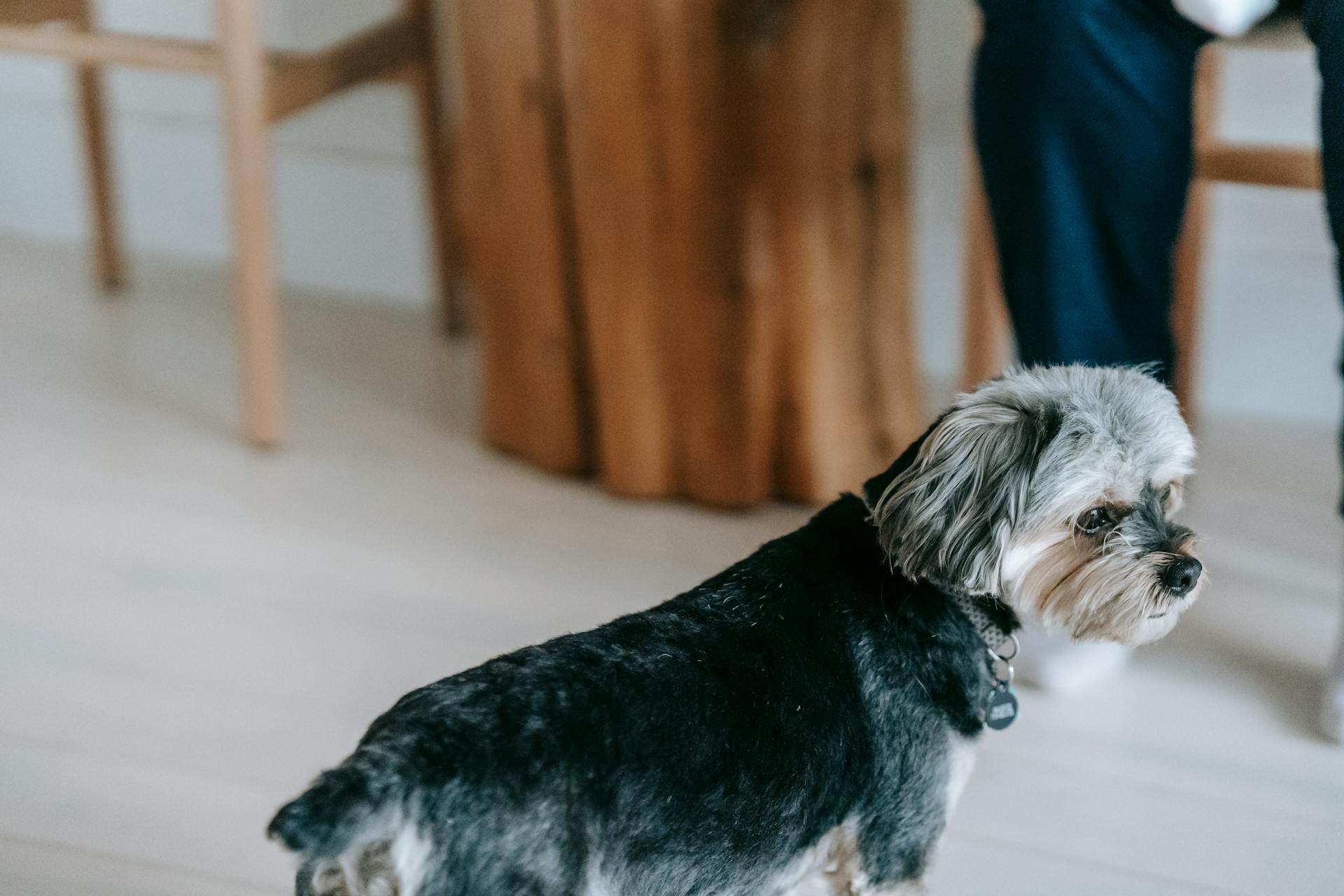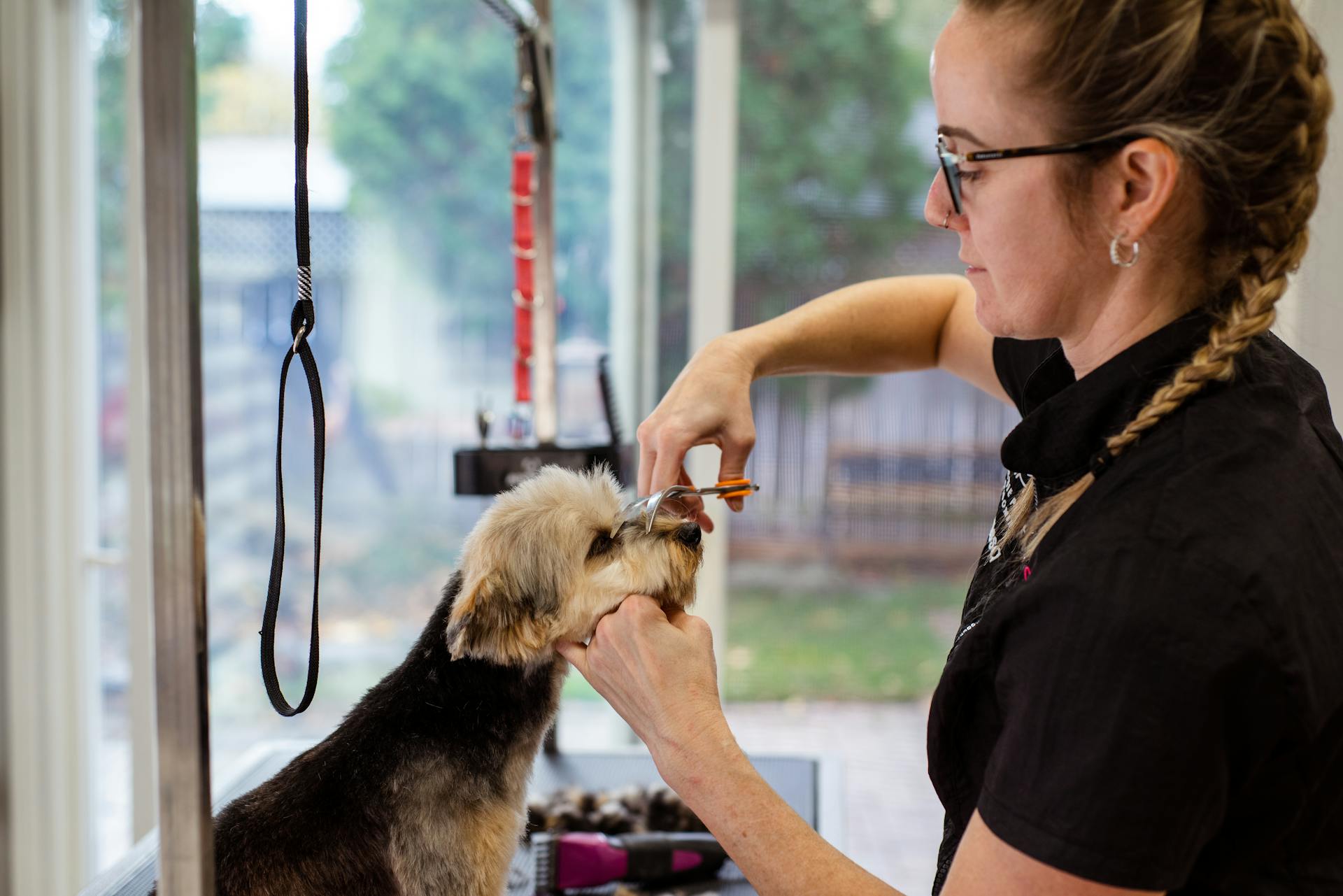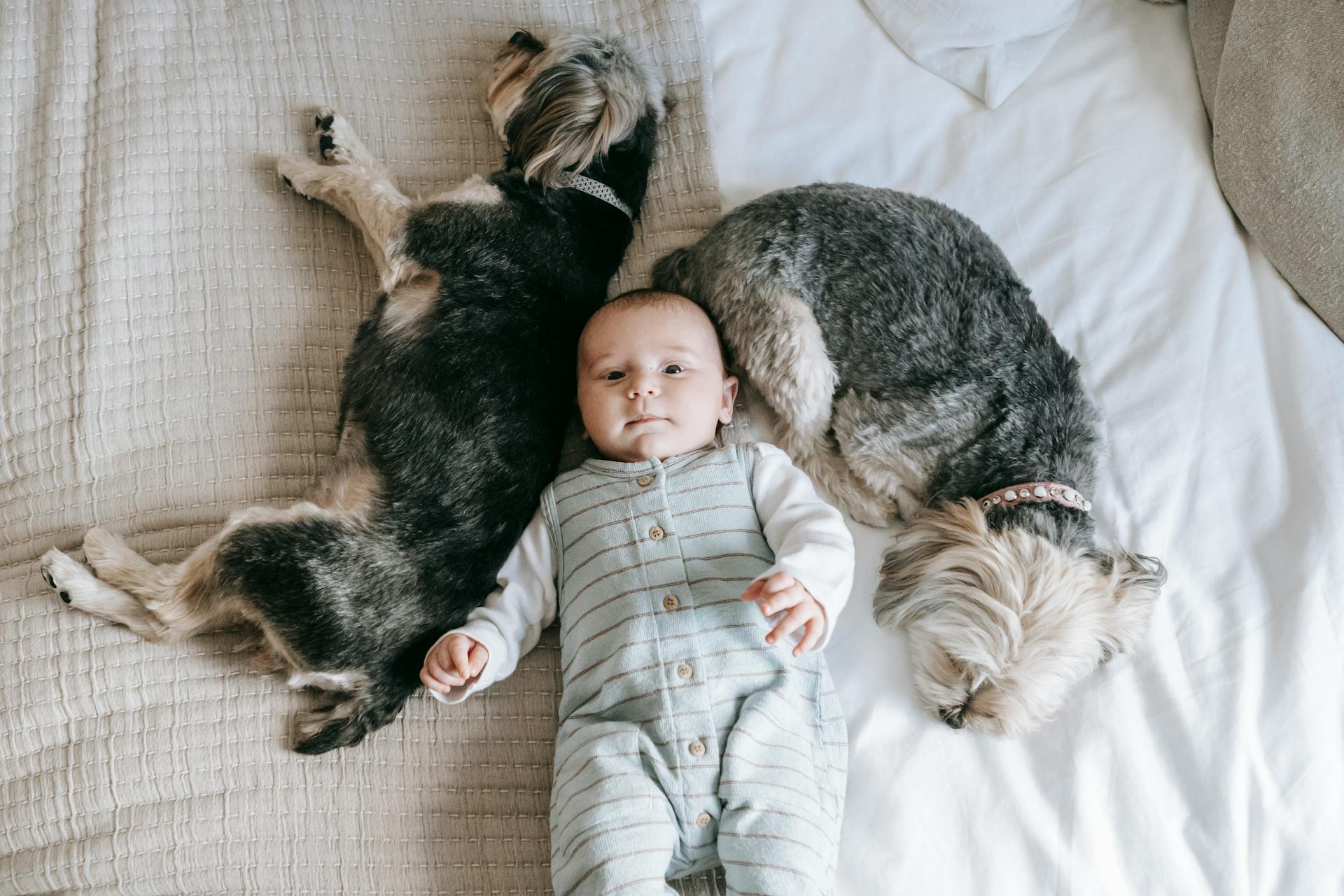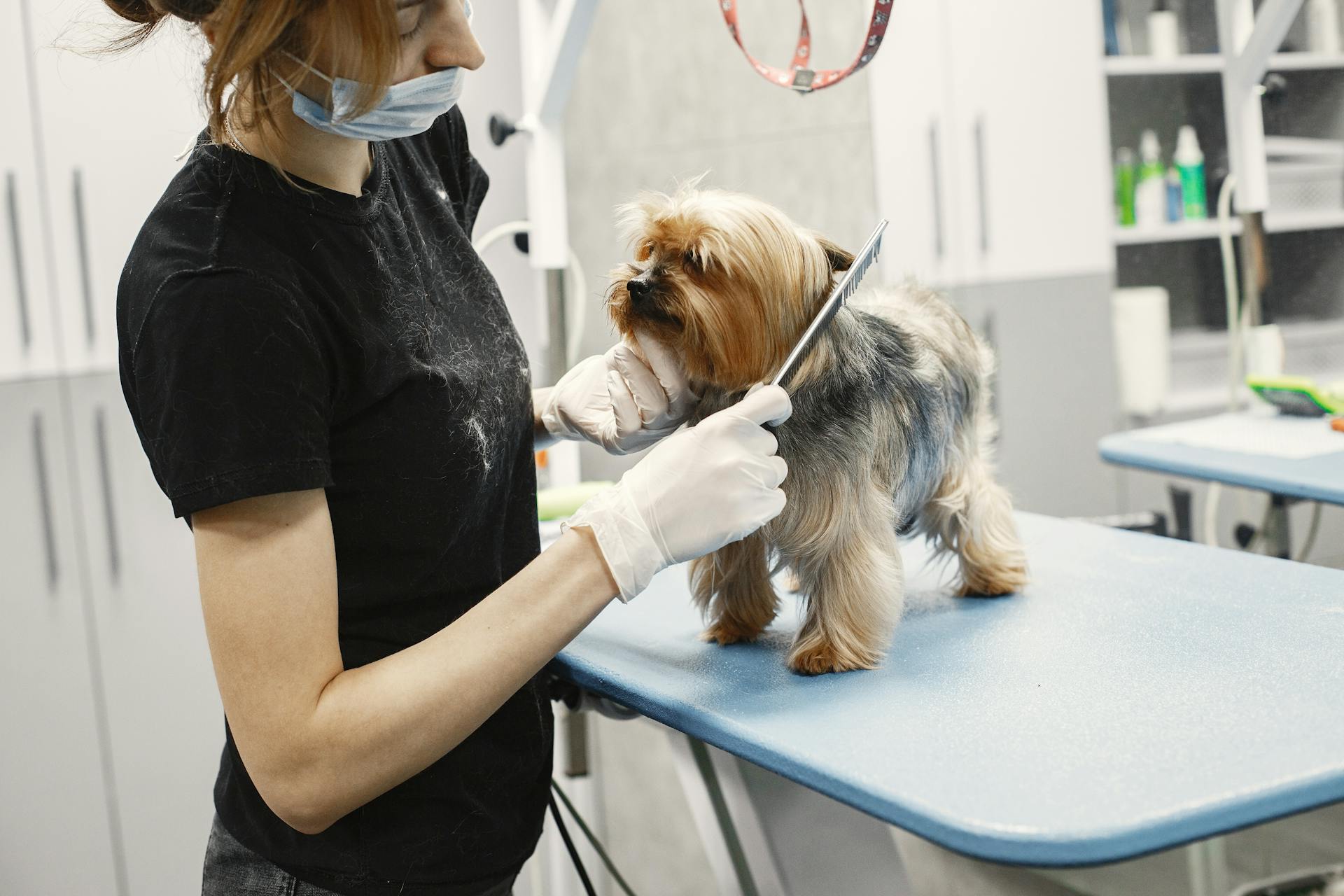
The Yorkie Poo and Morkie are two adorable hybrid breeds that have captured the hearts of many dog lovers. Both breeds are a cross between a Yorkshire Terrier and another popular breed, but they have distinct characteristics that set them apart.
The Yorkie Poo is a cross between a Yorkshire Terrier and a Poodle, typically a Toy or Miniature Poodle. This mix results in a low-shedding, hypoallergenic coat that requires regular grooming.
One of the main differences between the Yorkie Poo and Morkie is their size. Yorkie Poos tend to be slightly larger than Morkies, weighing between 7-15 pounds and standing about 6-10 inches tall at the shoulder.
A different take: Corgis Mixed with Other Breeds
Characteristics
Both the Yorkie Poo and Morkie are small dogs with a similar size range. The Morkie typically weighs between 7 to 13 pounds.
These tiny dogs are also known for their relatively short lifespan, ranging from 10 to 14 years. This means you'll have a long time to enjoy their company, but also plan for their eventual passing.
In terms of physical size, the Morkie stands between 7 to 10 inches at the shoulder, making them a compact companion.
Here's a comparison of the two breeds' bite force and biting potential:
As you can see, both breeds have a relatively weak bite force and low biting potential, making them a great choice for families with children or for those who want a low-maintenance pet.
Coat and Color
Morkies can have a wide range of coat colors, including black and tan, pure white or cream, and solid black.
Their coat color can also change over time, with darker shades often lightening as they grow older.
Some Morkies develop gray or silver tones as they age, a trait associated with the Yorkshire Terrier breed.
Coat Texture
The Morkie's coat texture is a fascinating topic. Many Morkies inherit the silky texture of the Maltese parent, known for its soft, smooth coat.
Their coat can also be straight or wavy, blending traits from both the Yorkshire Terrier and Maltese parents. This can result in a unique and beautiful coat that's all their own.
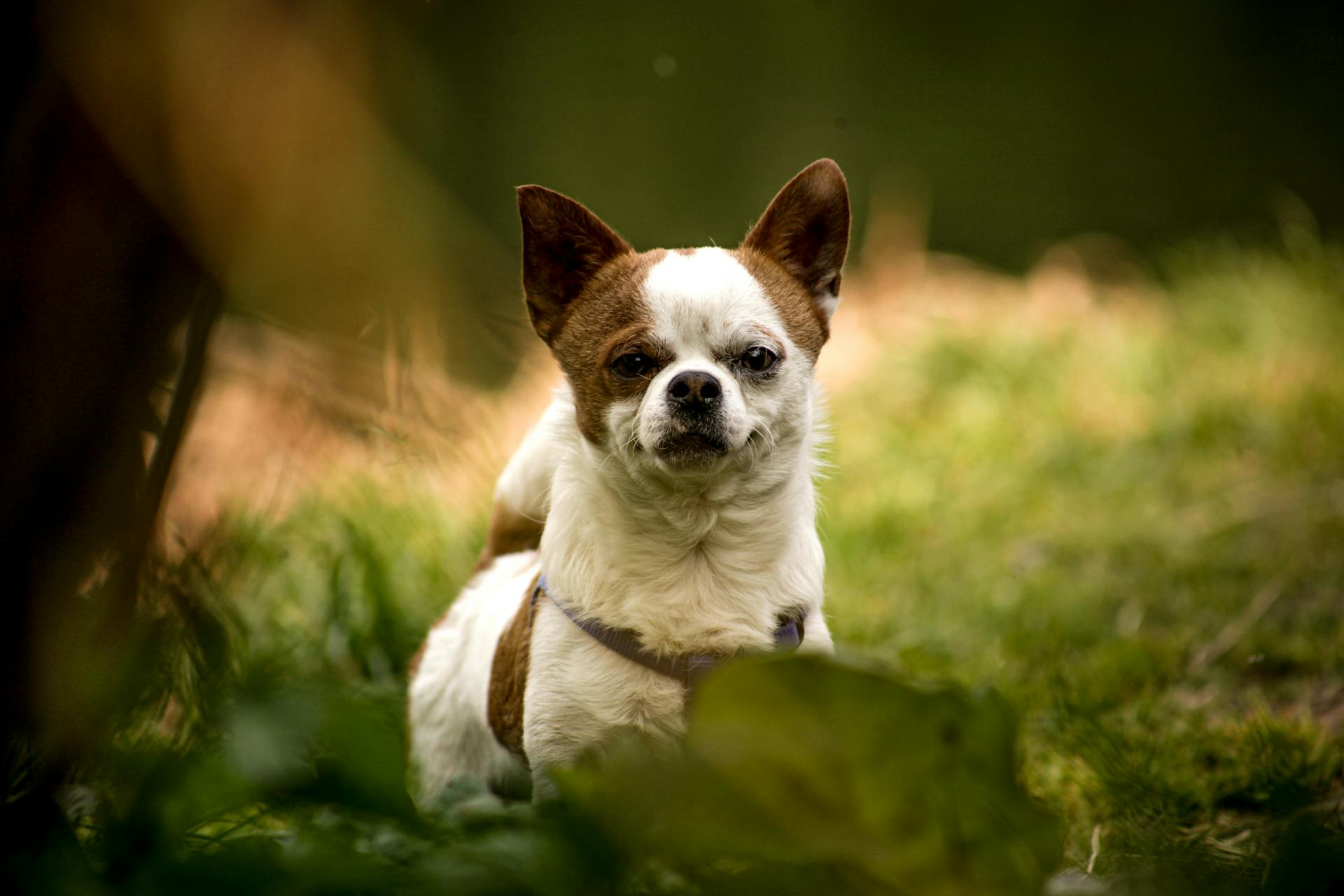
Morkies tend to have low-shedding coats, making them suitable for people with mild allergies. However, regular grooming is essential to prevent matting.
Here are the different coat types you can expect from a Morkie:
- Soft and Silky: Many Morkies inherit the silky texture of the Maltese parent.
- Straight or Wavy: The coat may be straight, like that of a Yorkshire Terrier, or wavy, blending traits from both parents.
- Non-Shedding or Low-Shedding: Morkies tend to have low-shedding coats, which makes them suitable for people with mild allergies.
Coat & Hypoallergenic Level
The Morkie Poo's coat is one of its most distinctive features, and it's also a major factor in its popularity as a hypoallergenic breed. Morkiepoos are considered hypoallergenic dogs, making them suitable for people who struggle with dog dander allergy.
Their parental breeds, the Yorkshire Terrier, Maltese, and Poodle, are all single-coated, which means they don't shed heavily. This trait is inherited by the Morkie Poo, making them a great choice for those with allergies.
Morkiepoos can come in a variety of coat types, including straight, curly, and wavy. The Yorkshire Terrier and Maltese both have long, silky, and straight hair, while Poodles have super curly locks. This combination of characteristics can make it tricky to predict the coat type of a Morkie Poo.
For more insights, see: Yorkies Hypoallergenic Dogs
While Morkiepoos are considered low-shedding, it's essential to note that there's no such thing as a completely hypoallergenic dog. However, Morkiepoos are a good option for those with mild allergies, as they shed very little and spread less dog dander and saliva particles that trigger allergies.
Here's a breakdown of the Morkie Poo's coat types and their characteristics:
- Straight coat: Inherited from the Morkie parent, straight coat is smooth and silky.
- Curly coat: Inherited from the Poodle parent, curly coat is super curly and requires regular grooming.
- Wavy coat: A combination of the straight and curly coat, wavy coat is a unique feature of the Morkie Poo.
Size and Weight
The size and weight of a Yorkie Poo and a Morkie are quite similar, but there are some subtle differences.
A Morkie typically weighs 7 to 13 pounds and stands 7 to 10 inches at the shoulder. Their Morkie Poo counterparts also weigh between 4 to 13 pounds with an average height of 7 to 10 inches.
Both breeds are considered toy-sized, and their height is usually measured around 7 to 9 inches tall at the shoulder. Some Yorkies and Malteses, the parent breeds of the Morkie, can weigh slightly above the average, up to 16 pounds and 11 pounds respectively.
Here's a comparison of the two breeds in a table:
The Yorkipoo and Morkie have similar daily food consumption needs, ranging from 1/2 to 1 cup of dry food per day. However, the Morkie is more prone to obesity if not monitored, while the Yorkipoo has a lower risk of obesity.
See what others are reading: Food for Yorkie Poo
Dog Grooming
Dog grooming is a crucial part of owning a Yorkie Poo or a Morkie. Both breeds require regular grooming to prevent matting, infections, and dental problems.
Their low-shedding coats mean they need more maintenance than some breeds, but this also makes them a good option for people with mild allergies. Regular grooming keeps them looking their best.
The Morkie's fluffy, long coat requires frequent brushing, unless you want a lapdog that looks like a Bergamasco or a Puli. A trip to a professional groomer to have its coat trimmed can keep it looking nice and healthy.
Bathing the Morkie is optional, but if you're grooming it yourself, a bath every month is recommended. You should also clean the area around the dog's eyes daily, as it's prone to tear stains.
If this caught your attention, see: How to Cut a Yorkie Poo Hair
The Morkie's ears need cleaning once a week, and its nails should be clipped at least twice a month. Daily brushing is also essential, especially if you're feeding it wet dog food.
Here's a comparison of the grooming needs of Yorkie Poos and Morkies:
Both breeds require regular hair trims, every 4 to 8 weeks, and weekly nail trims. Good ear hygiene is also essential to prevent infections.
Health and Lifespan
Morkies and Yorkipoos can live up to 15 years, although some may reach up to 17 years. Many of them grow old without significant health problems.
Both breeds can be prone to tracheal collapse, which leads to difficulty eating, frequent coughing, and respiratory problems. Cataracts and glaucoma can also impair their vision.
Morkies are commonly healthy dogs, but they may develop joint problems like patellar luxation, eye diseases like progressive retinal atrophy, and hypoglycemia. Regular vet check-ups can help prevent or detect these issues early on.
You might enjoy: Morkie Behavior Problems
Here are some common health issues in Morkies and Yorkipoos:
It's essential to keep your Morkie or Yorkipoo at a healthy weight, provide plenty of exercise, and minimize stress to maintain their overall health. Regular vet check-ups will also help detect any potential health issues early on.
Suggestion: Morkie Health Issues
Weight Management
When it comes to weight management, it's essential to consider the dietary needs of your furry friend. The Yorkipoo and Morkie breeds require similar daily food intake, around 1/2 to 1 cup of dry food per day.
Feeding your dog the right amount is crucial to prevent weight gain. The Morkie breed is more prone to obesity if not monitored, with an average to high risk of weight gain. On the other hand, the Yorkipoo has a lower risk of obesity, with a low to average risk.
To keep your dog at a healthy weight, it's essential to monitor their food intake and ensure they get regular exercise. By doing so, you can prevent weight-related health issues and ensure your dog lives a long and happy life.
Here's a comparison of the weight management potential of Yorkipoo and Morkie breeds:
Health and Lifespan

Morkies are generally healthy dogs, but like any breed, they can be prone to certain health issues. They can live up to 15 years, although some may reach up to 17 years with proper care.
One common health concern for Morkies is tracheal collapse, which can lead to difficulty eating, frequent coughing, and respiratory problems. Regular exercise and a balanced diet can help prevent this issue.
Morkies are also susceptible to dental problems, such as tooth decay and overcrowding, due to their small mouths. Regular dental check-ups and a healthy diet can help prevent these issues.
Eye problems, including progressive retinal atrophy and cataracts, are also common in Morkies. Regular eye exams can help detect these issues early on.
Morkies can also develop joint problems, such as patellar luxation and elbow dysplasia, which can affect their mobility. Providing a comfortable and supportive living space can help alleviate these issues.
Here's a list of common health issues in Morkies:
- Dental problems
- Tracheal collapse
- Eye problems (progressive retinal atrophy and cataracts)
- Joint problems (patellar luxation and elbow dysplasia)
- Hypoglycemia
- Legg-Calve-Perthes disease
- Portosystemic shunt
- Collapsing trachea
- Allergies
Morkies are generally a healthy breed, but regular veterinary check-ups and a balanced lifestyle can help prevent or manage these health issues.
Training and Behavior
Training and behavior are crucial aspects of owning a Morkie or Yorkie Poo. They're intelligent dogs that respond well to positive reinforcement, making them relatively easy to train.
Consistency is key when training a Morkie or Yorkie Poo. Use the same commands and routines to avoid confusion. They can lose interest if training sessions are too long or repetitive, so keep them short (10-15 minutes) and engage with varied activities.
Morkies and Yorkie Poos are prone to barking, especially if they feel protective of their family or environment. This can be a concern for families in close living quarters, such as apartments, unless they are trained to control their barking early on.
Here are some key training tips for Morkies and Yorkie Poos:
- Be Consistent: Use the same commands and routines to avoid confusion.
- Keep Training Sessions Short and Fun: Morkies and Yorkie Poos can lose interest if training sessions are too long or repetitive.
- Mental Stimulation: Incorporate puzzle toys, obedience training, and interactive games into their routine to challenge their mind.
Early socialization and positive reinforcement training are also crucial for Morkies and Yorkie Poos. They can be prone to separation anxiety and may exhibit a stubborn streak from time to time, but with the right training and socialization, they can thrive as loving and loyal companions.
Training and Socialization
Training a Morkie requires patience, consistency, and positive reinforcement. They're intelligent and eager to please, making them relatively easy to train with the right approach.
Morkies respond well to praise, treats, and affection when they exhibit desired behavior. Consistency is key, so use the same commands and routines to avoid confusion.
Early socialization is crucial, as Morkies can develop separation anxiety and become clingy if left alone for long periods. Introduce them to different people, animals, and environments from an early age to help them become confident and well-adjusted.
Training sessions should be short and fun, lasting around 10-15 minutes. Morkies can lose interest if training sessions are too long or repetitive, so mix up the activities and keep it engaging.
Morkies are prone to developing small dog syndrome, which can lead to excessive barking. Training them from an early age can help prevent this behavior and establish good communication with their owners.
Recommended read: Long Haired Morkie
Here are some tips for training your Morkie:
- Be consistent in your commands and routines.
- Keep training sessions short and fun.
- Use positive reinforcement techniques, such as praise and treats.
- Provide mental stimulation with puzzle toys and interactive games.
Remember, every dog is unique, and what works for one Morkie may not work for another. Be patient, stay consistent, and work with your Morkie to establish a strong bond and good behavior.
Bite Characteristics
When training your Yorkipoo or Morkie, it's essential to understand their bite characteristics. Both breeds have a weak bite force, ranging between 100 and 200 PSI, which is relatively low compared to other dog breeds.
The good news is that both Yorkipoos and Morkies have a low biting potential, meaning they are less likely to bite someone. This is a significant advantage for first-time dog owners or families with small children.
However, it's worth noting that both breeds have a strong tendency to nip, chew, play-bite, or herd people. This means they might not be the best fit for households with fragile items or young children who don't understand gentle play.
Here's a quick comparison of the bite characteristics of Yorkipoos and Morkies:
Overall, understanding your dog's bite characteristics is crucial for building trust and ensuring a harmonious household. By being aware of their tendencies and taking steps to address them, you can create a safe and loving environment for both your dog and your family.
Working Dog
As a responsible dog owner, it's essential to consider the working dog aspect of your pet's nature. Breeds like the Yorkipoo and Morkie are designed for companionship, but they still have a strong work ethic.
Their gestation length is relatively short, lasting around 60-64 days. This means they can have multiple litters in a year.
Breeding frequency is crucial for these breeds, as more frequent breeding is not healthy. It's recommended to breed them once a year.
If you're planning to breed your Yorkipoo or Morkie, it's essential to know their litter size. Yorkipoos can have 3-6 puppies, while Morkies typically have 3-5 puppies.
Here's a quick comparison of the two breeds' litter sizes:
Care and Feeding
Regular veterinary checkups are essential to detect any health concerns early in your Morkie. Your vet can help you develop a care routine that will keep your dog healthy.
A well-balanced diet is crucial for a Morkie, ensuring they stay healthy, maintain a good weight, and have the energy to support their playful personality. This requires attention to their size, age, activity level, and any specific health needs.
Morkies are prone to weight gain due to their small size, so it's essential to measure their portions carefully. The portion size for a Morkie depends on their age, weight, and activity level.
On a similar theme: Yorkie Poo Size
Family Compatibility
Morkies are generally excellent companion dogs, thanks to their affectionate, playful, and social nature.
They're a great match for families and individuals who can provide plenty of attention and affection.
Morkies are ideal for homes with older children, as they're a small breed and require gentle handling.
Responsible pet owners who understand their small size and grooming needs are also a good fit.
With proper socialization, supervision, and care, Morkies can thrive in various family environments.
They can be a perfect match for the right family, but it's essential to consider their needs and requirements.
History and Recognition
The Morkie breed has a murky past due to the lack of accurate breeding records, but it's believed to have originated in the late 1990s or early 1980s.
The first-generation Morkies are created by breeding a Maltese with a Yorkshire Terrier, resulting in a 50/50 mix of their traits.
The Morkie's history is closely tied to the popularity of "designer" dogs, which were showcased by Hollywood celebrities and social elites during the 1990s.
Creating a Morkie is a process that involves breeding a Maltese with a Yorkshire Terrier to produce F1 Morkies, which are the first-generation Morkies.
Since the Morkie's foundation breeds are the Yorkshire Terrier and the Maltese, it's essential to understand these breeds to determine the characteristics of the Morkie.
History of the Yorkshire Terrier
The Yorkshire Terrier has a rich history that dates back to the mid-19th century in England.
The breed was developed to catch rats in cotton mills and coal mines, where their small size and big attitude made them a valuable asset.
In 1865, the first breed standard for the Yorkshire Terrier was written, describing the dog as a "toy-sized" terrier with a big personality.
The breed quickly gained popularity as a companion animal, particularly among the working class.
The Yorkshire Terrier's original name was the "Roughened Terrier", but it was later shortened to simply "Yorkshire Terrier."
Their distinctive appearance, with a steel-blue and tan coat, was a result of breeding with local terriers and other small breeds.
Recognition
Recognition is a significant milestone in the journey of many individuals and organizations. In the context of our story, recognition is a testament to the hard work and dedication of those involved.
The first recognition of our subject's achievements dates back to 1995, when they received a prestigious award for their outstanding contributions to the field. This marked a turning point in their career, opening doors to new opportunities and collaborations.
Their work has been widely recognized by experts and peers alike, with many praising their innovative approach and commitment to excellence. The recognition has not only brought them personal satisfaction but also helped to raise awareness about the importance of their work.
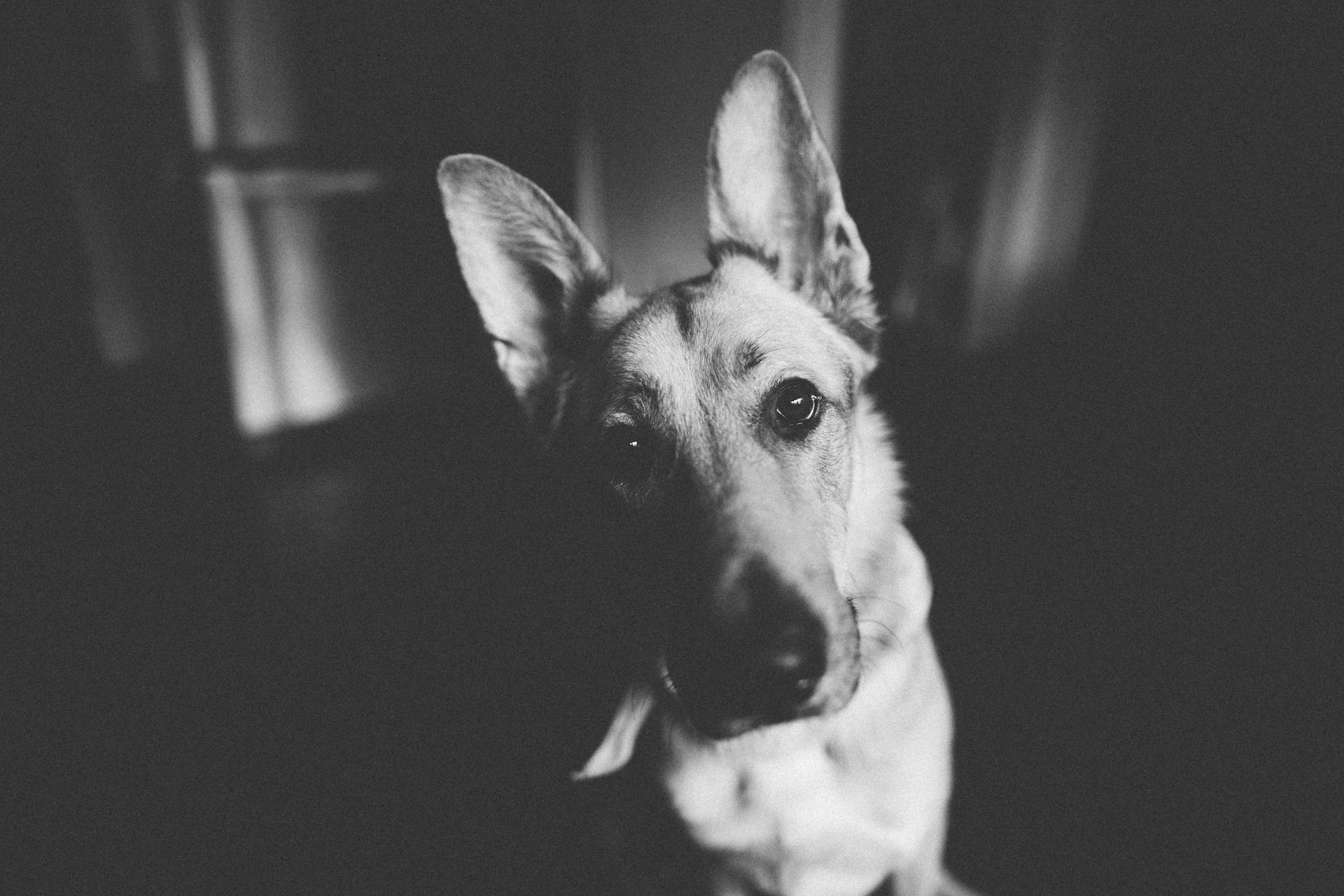
In 2005, they were awarded a highly respected honor for their tireless efforts to make a positive impact. This recognition has had a lasting impact, inspiring others to follow in their footsteps.
Their achievements have been celebrated in various publications and media outlets, cementing their status as a leading figure in their field.
Frequently Asked Questions
What is the difference between a Maltipoo and a Morkie?
Maltipoos are generally larger and have curlier coats than Morkies, due to their poodle parent. Discover the key differences between these two popular hybrids
Featured Images: pexels.com
